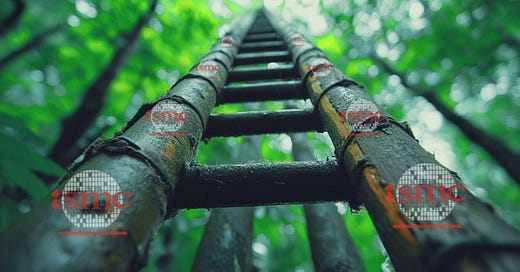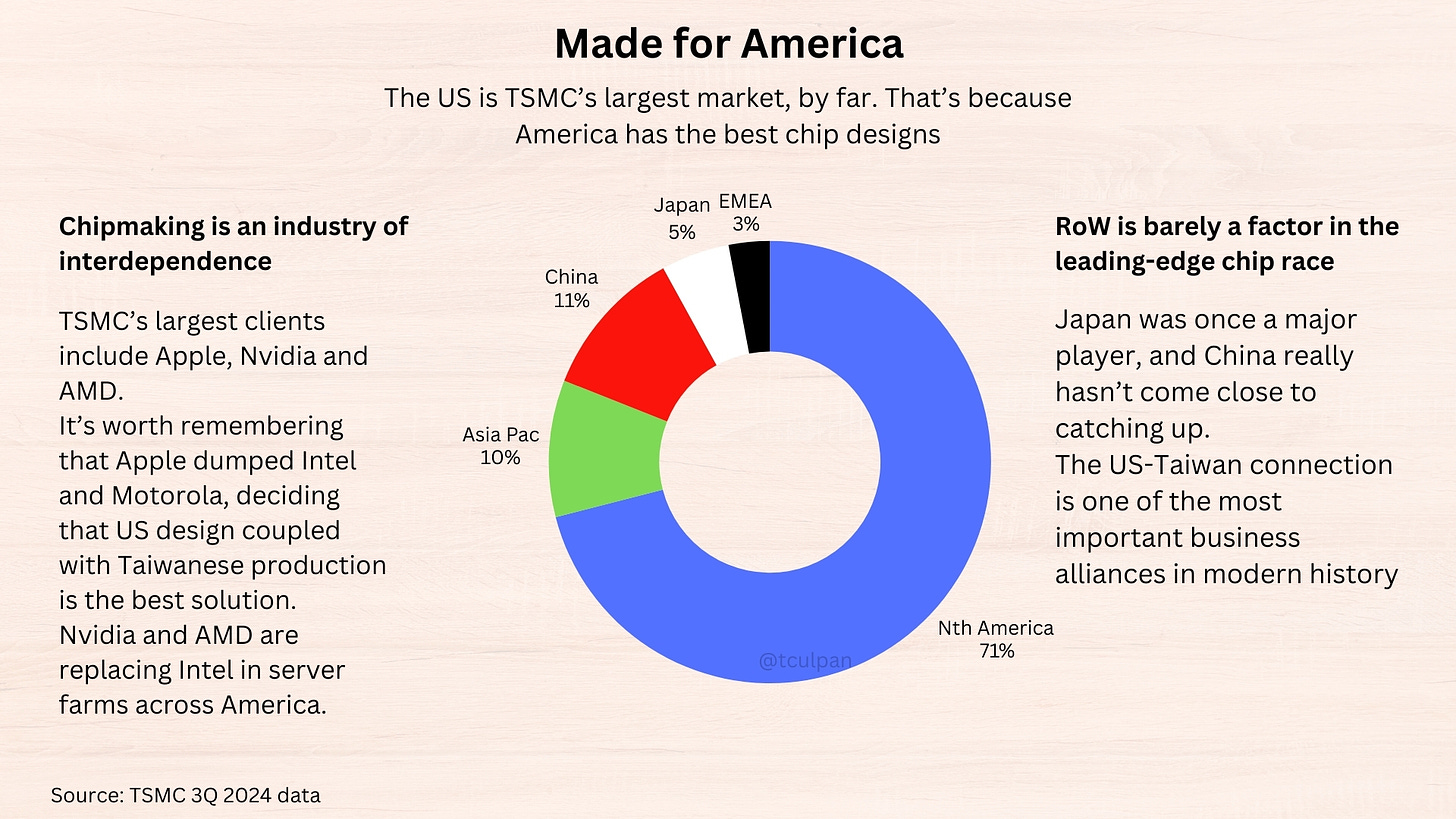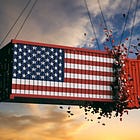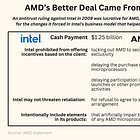TSMC Built a Bamboo Ladder. Trump Might Yet Shake It
[Opinion] Accusations of racism shine a light on tough decisions Trump's America needs to make as it tries to catch up on world-beating technology
Good Evening from Taipei,
It’s ironic that TSMC founder Morris Chang is releasing the final instalment of his autobiography just as a US racial-discrimination suit against the company throws his own words back at him.
Chang, 93, was born in pre-revolutionary China before moving to America where he went to college and climbed the ranks of Texas Instruments, taking up US citizenship along the way. But the Bamboo Ceiling limited his ascent.
According to some tellings, Chang’s ethnicity was a factor in the MIT-educated mechanical engineer being passed over as CEO. So he quit TI after a quarter century. He then went to General Instrument for a brief stint before packing up and moving to Taiwan. Chang, who retired six years ago, sees himself as primarily American. But if not for his Asian race, TSMC may never have been founded.
Deborah Howington believes that not being Asian is the primary reason why she was squeezed out of a senior role as an HR exec at TSMC in California. In a lawsuit filed in US District Court in San Jose, Howington quotes comments by Chang in 2021 in which he’s alleged to have said “computers of different brands can often be hooked together, but not people of different culture.” A dozen other plaintiffs have since signed on to the suit and their lawyers are seeking to make it a class action.
“TSMC believes strongly in the value of a diverse workforce and we hire and promote without regard to gender, religion, race, nationality, or political affiliation because we respect differences, and believe that equal employment opportunities strengthen our competitiveness,” it said in a response to my queries. The company declined to comment on this specific litigation.
Howington’s complaint outlines some actions, which if true, are quite egregious. Among them, retaliation for blowing the whistle on what she says is TSMC’s hiring practices favoring East Asians (note, the suit specifically says “East Asian”).
TSMC prefers to employ people of East Asian race and Taiwanese or Chinese national origin, including by bringing workers over from Taiwan and China on visas rather than hiring locally. This preference is reflected in every aspect of TSMC’s U.S.-based business — Howington et al v TSMC
But her allegation of racial discrimination rests almost entirely on the contention that TSMC wants, and in the workplace actively favors, Mandarin speakers and in so doing discriminates against non-East Asians.
That argument is weak, and in my opinion is racist in itself. It’ll be quickly torn to shreds. It’s built on two absurd ideas: that all East Asians are the same, and worse that only East Asians can speak Mandarin. (It also lumps Taiwanese and Chinese together, a clear indication that the plaintiffs and their lawyers don’t understand that these two groups are, and see themselves as, quite disparate). In truth, TSMC has hired numerous non-East Asians, of various races, who are fluent in Mandarin. Many of whom I’ve met personally.
Being Terrible v Being Racist
Let me be clear, there are other allegations in the complaint that are pretty bad, including moves to “bully some employees into resigning due to poor performance without proper training.” It’s hard to know how much of this is just one side’s view of office politics.
But TSMC isn’t being accused of being a terrible employer, it’s accused of being a racist one. This is not an allegation to be taken lightly.
In recent discussions with TSMC employees, both through social media and directly, I found the responses clearly divided. Taiwanese were adamant: “we’re not racist.” But anyone who’s ever been subject to racism will also know that racists often don’t think they are, in fact, racist.
The non-Taiwanese I spoke with were a little more cautious. Some told of feeling left out and marginalized. Turnover among non-East Asians appears higher. None were ready to cry “racism,” but they clearly felt the disparity.
This could be because the delineation isn’t actually race. The key difference more likely comes down to language. If you spoke Mandarin, you were in the cool kids’ club. If you didn’t, you were benched.
Cutting employees out because they don’t speak Mandarin isn’t racism, per se, but is pretty darn stupid. Being more inclusive isn’t an issue of ticking DEI boxes, which is what the CHIPS Act requires and what progressives have been pushing, it’s just good business.
TSMC faces a shortage of quality engineers both at home and abroad. It has a great opportunity to tap into a growing pool of new graduates from local US colleges like Arizona State. But if employees who don’t speak Mandarin feel excluded then they’re going to quit and TSMC will find it increasingly harder to hire the best talent.
Then again, if we accept the argument that TSMC does favor Mandarin speakers, and the rickety position that East Asians (of whatever nationality) are the only ones who can speak Mandarin, then there’s a second contention: that TSMC doesn’t have the right to ask its staff to have Mandarin skills. It’s a global company with “proficiency in English being a requirement to work at TSMC,” reads the lawsuit. Having lived half my life in Taiwan, and covered TSMC for just as long, I know this to be only partially true.
Presentations and materials are usually in English, but the fabs are filled with PhDs in physics, chemistry and electrical engineering from Taiwanese universities where instruction is in Mandarin. They’re not English majors, and it would be counterproductive to put language skills ahead of technical skills in the hiring process.
Mandarin, and in some cases the local Taiwanese dialect, are the lingua franca in Taiwan’s export-oriented companies. For firms where clients are exclusively English-speaking, having English skills is strongly favored but rarely the deciding factor.
And there’s also the doctrine of “necessary but not sufficient.” Even if English skills were strictly necessary, that doesn’t prevent TSMC — or any employer — from requiring other skills. Such as Word Processing, C++ coding, or Mandarin. That is, English is necessary, but not sufficient.
Since the non-English-majors who perfected the recipes back in Taiwan must then teach their US counterparts the very tricky art of making leading-edge chips, it’s not far-fetched to hope that the recipients of that instruction might be able to converse in Mandarin. The HR team must then use its best judgment to decide which skills to prioritize. Picking Mandarin over, say, “CMOS device operation” may be poor judgment, but that doesn’t mean it’s racist (again, assuming only East Asians can speak Mandarin).
TSMC Being TSMC
The timing of this case is extremely important. It was filed in August and then updated earlier this month to add further plaintiffs. But the suit will play out under the presidency of Donald Trump.
Trump faces quite the dilemma. The President is not adjudicating this case, the nation’s independent judiciary will. But his administration will soon control the executive, including nominating an Attorney General, while his Republican Party commands the legislature. And the last time he was in power he stacked the Supreme Court, the highest level of the judiciary, in his favor.
This is now Trump’s America. He will set the tone for the environment in which such a racial-discrimination case plays out both inside and outside the court room.
More broadly Trump, and the people he surrounds himself with, will influence the nation’s approach to diversity, equality and inclusion. His election was, in part, a rejection of what many see as a “woke mind virus.” If he wants to roll back the DEI trend — as he’s wont to do — then he’d need to recognize that companies like TSMC have a right to hire whomever they feel is best for the job. But if Trump wants to play the “Hire American” card, then he is tacitly agreeing to the diversity argument.
He can’t have it both ways, thought he may try.
It’s conceivable that Howington v TSMC makes it all the way to the Supreme Court, and if so the right-leaning jurists will face a similar dilemma. But another case seen by the Court kind of tips its hand, and ironically centered around Asian Americans.
In Students for Fair Admissions v. Harvard, the Court last year found against the university’s use of race to conduct affirmative action in selecting students. The Court’s decision is layered, but the key takeaway is that merit needs to be the primary factor. Asians were considered to be a big loser from affirmative action: the Court’s ruling was cheered among most of my US-educated Asian friends in Taiwan.
Then there’s plans to both bring more chipmaking to the US, and cut back the money allocated to make that happen.
Donald Trump may attempt to revise, or cancel, the CHIPS Act which provides more than $50 billion in funding to local and foreign companies to set up production in the US. TSMC, which plans to hire 20,000 people in Arizona — including 6,000 engineers — and has the world’s best chip-production technology, was awarded $6.6 billion by the Commerce Department. Intel, which is falling behind and recently fired 15,000 people won $8.5 billion.
It’s true that, as of this moment, no money has actually been given out because it comes in instalments for hitting various milestones. It’s also true that, as of this moment, TSMC is making Apple processors — albeit an older design — on US soil while Intel had to send its most-advanced chips to Taiwan for TSMC to make. Also, as I reported recently, TSMC will make advanced high-performance computing chips for AMD in Arizona next year.
That juxtaposition, on the surface, looks like a good reason for the new administration to turn up the heat on TSMC and the Taiwan government to further expand in America. Many in Taiwan see Trump’s recent comments about stealing America’s chip business (provably false, by the way) as a shakedown — the incoming president believes Taiwan isn’t doing enough to bolster its defenses against China and wants the island nation to pay.
The US wants better chips. Taiwan needs better defenses. It’s a pretty simple trade. But if America is to get the world’s best production technology it needs to let TSMC be TSMC. And that may also mean letting TSMC be stupid in its human resources practices. This is not a particularly progressive argument, but many in Trump’s conservative camp — including the most-famous member of his Cabinet — believe that DEI values are holding the nation back.
Taiwan Semiconductor Manufacturing Co. is not a typical Taiwanese company. TSMC is more like an American company with Taiwanese characteristics — or perhaps a Taiwanese company with American characteristics. One reason is that, apart from the direction set by Chang, its leadership is stacked with foreign-educated Taiwanese — many of whom hold US citizenship and returned to the home of their birth to join the chip foundry in the ‘80s and ‘90s.
As a result, Morris Chang built a Bamboo Ladder up which thousands of Taiwanese climbed, reaching the very pinnacle of the global semiconductor industry. The path up this ladder includes brutally long hours and extreme pressure under tight deadlines. It’s a rough journey, but not racist unless you want to claim that non-East Asians aren’t able to work hard in tough circumstances. And if that’s the case, then don’t take a peek at how fast-moving companies like Elon Musk’s SpaceX and Tesla operate.
If TSMC were just like Intel, or Motorola, or IBM, or Fairchild then it wouldn’t be the world’s best chip manufacturer.
Maybe Chang was right when he said “the fact that TSMC’s topflight executives can deliver top results in Taiwan is no guarantee of similar performance when they are posted overseas.” Or maybe, as Howington infers in her lawsuit, this statement is mere proof that the company is racist.
Either way, it’s impossible to conclude that Americans cannot make the world’s best chips. They do, after all, design the world’s best chips. And they make the best software for designing those chips. And much of the equipment and chemicals needed to manufacture those chips.
But right now, the simple fact is Americans do not make the world’s best chips. Taiwanese do. Atop a Bamboo Ladder built by an East Asian American who set up shop in Taiwan.
President Trump, and the America he will soon lead, can choose to shake that ladder. But they need to decide whether that’s the best way to Make America Great Again.
Thanks for reading.
Other Articles Chosen For You:









